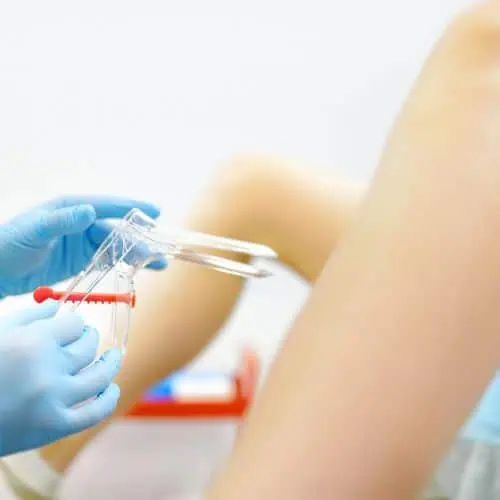An Introduction from Dr. Aliabadi

Dear patients,
I recently had the chance to share my insights on comprehensive women’s health care during an appearance on the Today Show, where I discussed the importance of well-woman visits that go far beyond the standard Pap smear and mammogram.
As your doctor, I believe it’s important for you to understand that your annual exam should be a thorough review of your overall health — including screening for conditions like PCOS and endometriosis that can impact fertility, assessing your breast cancer risk, hormone health, and preparing for perimenopause and beyond.
In this Today Show segment, I’ve provided detailed checklists for different life stages so you can feel empowered to advocate for yourself and know exactly what screenings and discussions to have during your visits.
My goal has always been not just to address problems as they come up, but to help you foresee risks, safeguard your long-term health, and genuinely thrive at every stage of life—and you should never have to “tough out” uncomfortable symptoms when effective treatments are accessible.
A Checklist for Well Woman Visits at Every Age, From Dr. Thais Aliabadi
Many women assume that during their annual well-woman visit, the only tests they need to worry about are a Pap smear to check for cervical cancer and a mammogram to check for breast cancer. But according to OB-GYN, surgeon, and co-host of the She MD podcast, Dr. Thais Aliabadi, there are numerous other tests that women should also be receiving to better understand their health and prevent possibly life-threatening conditions.
The questions you should be asking your doctor depend on your stage of life, Aliabadi explains.
For example, if a teenage girl is struggling with painful or irregular periods, Aliabadi wants her to know that’s not normal and that she should be screened for endometriosis or polycystic ovary syndrome (PCOS). For women of reproductive age interested in knowing more about their fertility, it’s possible to find out their egg count. And if you’re approaching menopause and losing sleep, gaining weight, or experiencing other changes, you should bring these up at your check-up.
Unfortunately, many OB-GYNs don’t prioritize gathering as much information as they can about patients because they have limited time per patient, Aliabadi says. That’s why it’s important for women to be their own advocates when it comes to their symptoms and important health screenings, she adds.
Here’s her checklist to take to your next well-woman visit, depending on your stage of life. And many of these, if not all, will be covered by insurance.
For Women Teens to 40s
Screenings

- General history
- Breast exam
- Breast imaging (mammogram, ultrasound, and MRI, depending on your risk)
- Pelvic exam and ultrasound
- Pap smear and HPV
- Sexually transmitted infections
- Screening for underlying health conditions (PCOS, endometriosis, insulin resistance, thyroid dysfunction and autoimmune disorders)
- Mental health screenings for conditions including anxiety, depression, and eating disorders
- Breast cancer risk assessment
- Genetic testing to determine if there is a family history of cancer
- Egg count test (AMH)
- Hormone panel
Conditions to Be Aware of
PCOS
Polycystic Ovary Syndrome (PCOS) is a common condition where the ovaries make higher-than-normal levels of androgens, or male-type hormones. This can interfere with ovulation and raise the risk of infertility, diabetes and heart disease. Common signs include irregular or missed periods, excess hair growth, acne and weight changes.
There isn’t a single test for PCOS, and diagnosis is based on a combination of symptoms, blood tests to check hormone levels, and an ultrasound to look at the ovaries.
Endometriosis
Endometriosis affects 10% of women and is one of the top causes of infertility, according to Aliabadi. It is a condition where tissue similar to the lining of the uterus grows outside of it. Common signs include very painful periods, pain with sex, and bowel or bladder pain during menstruation.
Many women face years of delays before getting a diagnosis. Diagnosis is based on symptoms, a pelvic exam, imaging such as ultrasound or MRI, and sometimes laparoscopy, a minor surgery that allows doctors to look inside the pelvis directly.
Breast cancer
Aliabadi wants every woman to know her lifetime risk of breast cancer by age 30, using tools like the Tyrer-Cuzick Risk Calculator. For most women, breast imaging should start at age 40, but if there’s a family history, start 10 years before your youngest affected relative’s diagnosis.
Women at high risk — 20% or more in their lifetime — may need to begin screening as early as age 30, and women with genetic mutations may need to start as early as 25.
Genetic testing is especially important for women with a family history of breast or ovarian cancer, since results can guide when and how screening begins. Women with dense breasts or a high lifetime risk of breast cancer benefit from extra imaging such as ultrasound or MRI (in addition to mammograms). Aliabadi also recommends 3D mammography for women with dense breast tissue.
Vaccine-preventable illnesses
Make sure you are up to date on important vaccines, such as HPV, COVID, Tdap, as well as the flu shot.
For Women in Perimenopause and Menopause
Screenings
- General history
- Pelvic ultrasound
- Mammogram and other indicated breast imaging (ultrasound or MRI)
- Hormone testing, especially if experiencing menopause symptoms
- Colonoscopy
- Bone density test (DXA)
- Heart health: full lipid panel including APOB and lipoprotein (a), hs-CRP (inflammation marker), fasting glucose, HbA1c
- Coronary calcium scan
- Dementia markers, such as Apoe4
- Metabolic health markers, such as blood sugar, thyroid, and vitamin levels
- Genetic testing, if there’s a new family history of cancer
Conditions to Be Aware of
Perimenopause and menopause symptoms
These can include hair loss, hot flashes, sleep problems, vaginal dryness, painful sex, mood swings, brain fog, and weight gain, especially in the abdomen. The good news is that many of these are treatable, Aliabadi says.
If you experience any of these, you don’t need to “tough it out,” she adds. Bring them up with your doctor. Depending on your symptoms and health history, your doctor may order tests such as estradiol, progesterone, testosterone, FSH, LH, thyroid function, vitamin D, cholesterol, and HbA1c. Based on results, treatment options may include hormone therapy, non-hormonal medications, or local vaginal estrogen.
Vaccine-preventable illnesses
Older women should be up to date on flu, Tdap, shingles, pneumonia, and COVID vaccines.
For all women, here’s the bottom line
Ultimately, Aliabadi wants women to know that they don’t need to muscle through uncomfortable symptoms, whether it’s painful periods as a teen or hot flashes later in life. And it’s important to be proactive about hormone health before perimenopause, she adds.
If you’re interested in having children, you should seek info about your fertility potential, and its key to start healthy habits before perimenopause to protect bone and heart health. These include eating a balanced diet of mostly whole foods and regular exercise, especially strength training.
“A woman’s exam should never be just a Pap smear, a pelvic exam, or a breast check. It needs to be a comprehensive look at her whole health, from conditions like PCOS and endometriosis that affect fertility, to awareness of perimenopause symptoms, heart and bone health, and everything in between,” Aliabadi says.
“The goal is not only to treat problems as they arise, but to anticipate risks, protect long-term health, and empower women to thrive at every stage of life.”
For more information about women’s health from Aliabadi, visit SheMD.com.
Written by Maura Hohman
Maura Hohman is Assistant Managing Editor for TODAY.com and has been covering health and wellness since 2015.
You can read this article and watch the video online here:
https://www.today.com/health/womens-health/checklist-well-woman-visit-rcna225937














